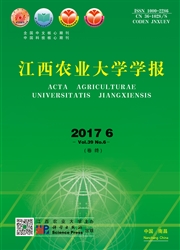

 中文摘要:
中文摘要:
选取南方重要速生造林树种——杉木为研究对象,采用砂培法即在石英砂中添加不同浓度草甘膦(0、2、5、10、50 mg/kg)进行杉木种子发芽试验,研究林业上广泛使用的除草剂草甘膦对杉木种子萌发及幼苗生长影响,为评估林业除草剂对人工林环境的生态风险提供科学依据。结果表明,随着草甘膦浓度增加,杉木种子发芽率、萌发后幼苗的根长、茎长、叶长和鲜质量受到的抑制作用越显著,且根长对草甘膦的反应最敏感。此外,草甘膦浓度升高使杉木幼苗SOD活性下降,CAT活性上升,POD活性则呈现先升后降的趋势,同时造成MDA含量上升和叶绿素含量下降。因此认为草甘膦对杉木种子发芽具有抑制效应,并导致幼苗抗氧化酶系统功能紊乱,造成细胞氧化损伤以及叶绿素合成受阻。
 英文摘要:
英文摘要:
Glyphosate is one of the most widely used herbicides in forestry and agricultural production,but it may affect the non-target organisms in soils. Therefore,a laboratory experiment was conducted to investigate the effects of glyphosate on seed germination and seedling growth of Chinese fir which is one of the important fast-growing species in the south and assess the ecological risk of glyphosate to artificial forest. The results showed that,the seed germination rate as well as the root length,stem length,leaf length and fresh weight of seedlings decreased significantly with the increase of glyphosate. The root length was more sensitive to glyphosate than other indexes. In addition,with the increase of glyphosate,the activity of SOD and chlorophyll content in Chinese fir seedlings decreased,while the activity of CAT and MDA content increased. The activity of POD presented earlier increased and then declined. There is an inhibitory effect of glyphosate on Chinese fir seeds and seedlings,which led to antioxidant enzyme dysfunction,oxidative damage of cell and declined chlorophyll synthesis.
 同期刊论文项目
同期刊论文项目
 同项目期刊论文
同项目期刊论文
 期刊信息
期刊信息
